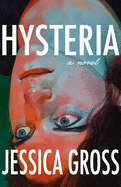
Jessica Gross's debut novel, Hysteria, is a heated, propulsive dive into a troubled young woman's all-night bender. An unnamed protagonist's sexual exploits have been getting increasingly out of control. After a double-header of sleeping with her psychiatrist parents' middle-aged colleague and her beloved roommate's off-limits brother, she senses she's hit rock bottom. To numb her desire, she starts her day drinking at a local dive bar, only to find that the bartender bears an uncanny resemblance to Freud. Over the course of the next 24 hours, a series of dizzying interactions with this Freud-figure brings her to the brink of self-discovery.
Gross's prose conveys casual brilliance, highlighting the extraordinary in the mundane in a way that helps ground the novel's dreamlike plot. Throwaway descriptions, such as how a character's "feet were long and delicate, like greyhounds" paint impressionistic, surreal images that are nonetheless vivid in their accuracy. The narrator, a pitch-perfect millennial flâneur, encounters every sexual act and bizarre situation with deep-gutted melancholy, conjuring a hard-edged eroticism and slow-burn tension that propels readers forward.
As the protagonist falls headlong into her downward spiral, readers, too, may begin to experience her fear of seeming unwell, and question every act as a potential coping mechanism against that perception. Thus, the novel becomes the ultimate example of a clever and deeply felt character study, asking readers to consider their own self-implication when making a study of the character. --Alice Martin, freelance writer and editor

